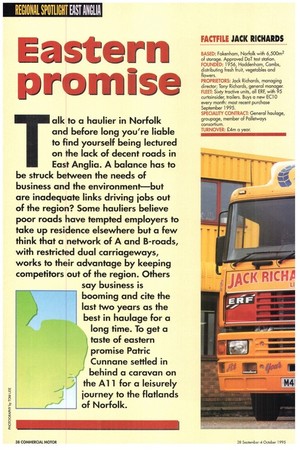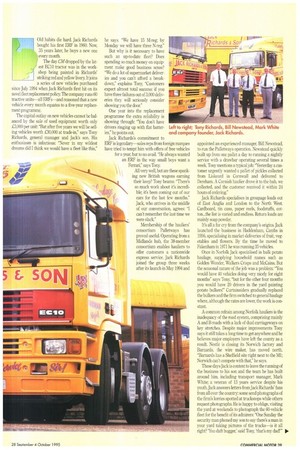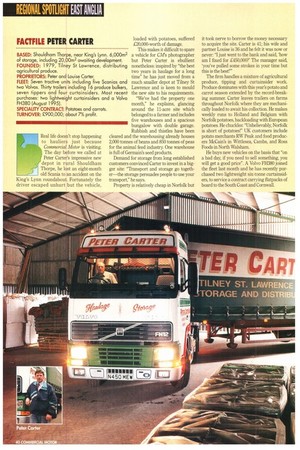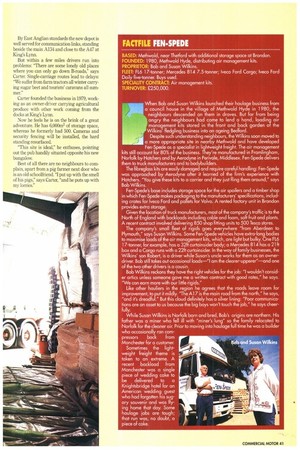Eastern promise
Page 40

Page 41

Page 42

Page 43

If you've noticed an error in this article please click here to report it so we can fix it.
iiialk to a haulier in Norfolk and before long you're liable to find yourself being lectured on the lack of decent roads in East Anglia. A balance has to be struck between the needs of business and the environment—but are inadequate links driving jobs out of the region? Some hauliers believe poor roads have tempted employers to take up residence elsewhere but a few think that a network of A and B-roads, with restricted dual carriageways, works to their advantage by keeping competitors out of the region. Others say business is booming and cite the last two years as the best in haulage for a
long time. To get a
i taste of eastern promise Patric Cunnane settled in behind a caravan on the Al 1 for a leisurely journey to the flatlands of Norfolk.
Old habits die hard. Jack Richards bought his first ERF in 1960. Now, 35 years later, he buys a new one every month.
The day GM dropped by the latest EC10 tractor was in the workshop being painted in Richards' striking red and yellow livery. It joins a series of new vehicles purchased since July 1994 when Jack Richards first hit on its novel fleet replacement policy. The company runs 60 tractive units—all ERFs—and reasoned that a new vehicle every month equates to a five-year replacement programme.
The capital outlay on new vehicles cannot be balanced by the sale of used equipment worth only £3,000 per unit: "But after five years we will be selling vehicles worth £30,000 at trade-in," says Tony Richards, general manager and Jack's son. His enthusiasm is infectious: "Never in my wildest dreams did I think we would have a fleet like this," he says. "We have 15 M-reg; by Monday we will have three N-reg."
But why is it necessary to have such an up-to-date fleet? Does spending so much money on equipment make good business sense? "We do a lot of supermarket deliver. ies and you can't afford a break down," explains Tony, "Customer, expect almost total success: if you have three failures out of 3,000 deliveries they will seriously consider showing you the door."
One year into the replacement programme the extra reliability is showing through: "You don't have drivers ringing up with flat batteries," he points out.
Jack Richards's commitment to ERF is legendary—sales reps from foreign marques have tried to tempt him with offers of free vehicles for a year, but to no avail. "He always wanted an ERF in the way small boys want a Ferrari," says Tony.
All very well, but are these spanking new British wagons earning their keep? Tony beams: "There's so much work about it's incredible; it's been coming out of our ears for the last few months." Jack, who arrives in the middle of our conversation, agrees: "I can't remember the last time we were slack."
Membership of the hauliers' consortium Palletways has proved useful. Operating from a Midlands hub, the 38-member consortium enables hauliers to offer customers a nationwide express service. Jack Richards joined the group three weeks after its launch in May 1994 and appointed an experienced manager. Bill Newstead, to run the Palletways operation. Newstead quickly built up from one pallet a day to running a nightly service with a drawbar operating several times a week. Tony mentions a typical job: "Yesterday a customer urgently wanted a pallet of pickles collected from Liskeard in Cornwall and delivered to Dereham. A Cornish haulier drove it to the hub, we collected. and the customer received it within 24 hours of ordering" Jack Richards specialises in groupage loads out of East Anglia and London to the North West. Cardboard, tin cans, paper reels, foodstuffs, cotton...the list is varied and endless. Return loads are mainly soap powder.
It's all a far cry from the company's origins. Jack launched the business in Haddenharn, Cambs in 1956, specialising in market deliveries of fruit, vegetables and flowers. By the time he moved to Fakenham in 1971 he was running 35 vehicles.
Once in Norfolk Jack specialised in bulk potato haulage, supplying household names such as Golden Wonder, Walkers Crisps and McCains. But the seasonal nature of the job was a problem: "You would have 40 vehicles doing very nicely for eight months" says Tony, "but for the other four months you would have 20 drivers in the yard painting potato bulkers!" Curtainsiders gradually replaced the bulkers and the firm switched to general haulage where, although the rates are lower, the work is constant.
A common refrain among Norfolk hauliers is the inadequacy of the mad system, =prising mainly A and B-roads with a lack of dual carriageways on key stretches. Despite major improvements Tony says it still takes a long time to get anywhere and he believes major employers have left the county as a result. Nestle is closing its Norwich factory and Barnard.% the wire maker, has moved north. "Barnards has a Sheffield site right next to the Ml; Norwich can't compete with that," he says.
These days Jack is content to leave the running of the business to his son and the team he has built around him, including transport manager, Mark White; a veteran of 13 years service despite his youth. Jack answers letters from Jack Richards' fans from all over the country: some send photographs of the firm's lorries spotted at truckstops while others request photographs. He is happy to oblige, visiting the yard at weekends to photograph the 60-vehicle fleet for the benefit of its admirers: "One Sunday the security man phoned my son to say there's a man in your yard taking pictures of the trucks—is it all right? 'You daft bugger,' said Tony, 'that's my dad!'" Real life doesn't stop happening to hauliers just because Commercial Motor is visiting. The day before we called at Peter Carter's impressive new depot in rural Shouldham Thorpe, he lost an eight-month old Scania to an accident on the King's Lynn roundabout. Fortunately the driver escaped unhurt but the vehicle, loaded with potatoes, suffered £20,000-worth of damage.
This makes it difficult to spare a vehicle for CM's photographer but Peter Carter is ebullient nonetheless: inspired by "the best two years in haulage for a long time" he has just moved from a much smaller depot at Tilney St Lawrence and is keen to mould the new site to his requirements.
"We've had the property one month," he explains, glancing around the 11-acre site which belonged to a farmer and includes five warehouses and a spacious bungalow with double garage. Rubbish and thistles have been cleared and the warehousing already houses 2,000 tonnes of beans and 850 tonnes of peas for the animal feed industry. One warehouse is full of Germain's seed products.
Demand for storage from long established customers convinced Carter to invest in a bigger site: "Transport and storage go together—the storage persuades people to use your transport," he says.
Property is relatively cheap in Norfolk but it took nerve to borrow the money necessary to acquire the site. Carter is 41; his wife and partner Louise is 36 and he felt it was now or never: "I just went to the bank and said, 'how am I fixed for £450,000?' The manager said, 'you've pulled some strokes in your time but this is the best!"
The firm handles a mixture of agricultural produce, tipping and curtainsider work. Produce dominates with this year's potato and carrot season extended by the record-breaking summer. Carter leaves trailers on farms throughout Norfolk where they are mechanically loaded to await his collection. He makes weekly runs to Holland and Belgium with Norfolk potatoes, backloading with European potatoes. He chuckles: "Unbelievably, Norfolk is short of potatoes!" UK customers include potato merchants RW Peak and food producers McCain's in Wittlesea, Cambs, and Ross Foods in North Walsham.
He buys new vehicles on the basis that "on a bad day, if you need to sell something, you will get a good price". A Volvo FH380 joined the fleet last month and he has recently purchased two lightweight six-tonne curtainsiden, to service a contract carrying flatpacks of board to the South Coast and Cornwall. By East Anglian standards the new depot is well served for communication links, standing beside the main A134 and close to the A47 at King's Lynn.
But within a few miles drivers run into problems: "There are some lonely old places where you can only go down B-roads," says Carter. Single-carriage routes lead to delays: "We suffer from farm tractors all winter carrying sugar beet and tourists' caravans all summer."
Carter founded the business in 1979, working as an owner-driver carrying agricultural produce with other work coming from the docks at King's Lynn.
Now he feels he is on the brink of a great adventure. He has 6,000m2 of storage space, whereas he formerly had 500. Cameras and security fencing will be installed, the hard standing resurfaced.
"This site is ideal," he enthuses, pointing out the pub handily situated opposite his new bungalow.
Best of all there are no neighbours to complain, apart from a pig farmer next door who is an old schoolfriend. "I put up with the smell of his pigs," says Carter, and he puts up with my lorries."




































































































































